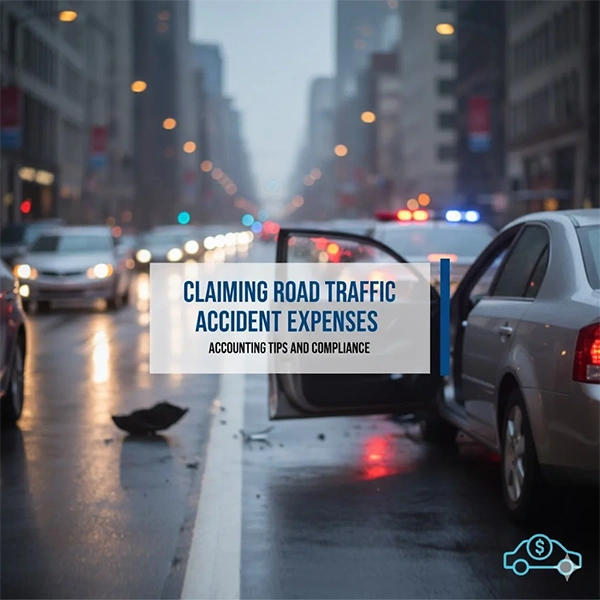
The World Health Organization has claimed – “An average of more than 3% of most countries’ GDP is used in road traffic accidents”. And more surprisingly, this cost is not just gone in lives, but in repair, medical, and legal expenses.
Accidents take place in seconds, but the connected consequences – from medical bills to insurance claims take time to recover. Whether you are an individual or a businessman managing vehicles, knowing how to claim a road traffic accident can make a remarkable difference in finances.
For instance, Ravi, a corporate world employee, met with an accident that took place in less than the blink of an eye. Delayed vehicle and medical claims pressured him mentally and emotionally.
But when he organized all the documents and reports, his accountant helped him recover 85% of the expenditure with insurance and tax adjustments. This shows that proper accounting, documentation, and some effective steps can help you claim back most of the expenses.
Let’s explore those accounting tips and compliances that can help claim road traffic accident expenses.
Understanding Claimable Road Traffic Accident Expenses
If you have ever witnessed an accident, you might have seen that accidents come with a chain of financial consequences. But not every accident is claimable. Yes, many reports of a particular country have shown that around 50% of the fatal accident victims’ families have not received a claim.
You might be thinking, What aspects of an accident are claimable? So, the claimable expenses include replacement costs, medical treatments, rental vehicles, and loss of business income, in case the vehicle was used commercially.
The golden rule is that if the claim is not justified and considerable, then it’s not restorable.
Accounting for Road Traffic Accident Expenses
Now, let’s understand what needs to be done to account for a road traffic accident expense. This consists of three major steps:
Create a Dedicated File
The first step is to get the documents organized. Imagine a request for a claim with unarranged and scattered documents – chaotic, right? So, create a separate folder for all related documents.
Include medical reports, police reports, and other related documents. This will not only simplify claims but will serve as evidence during audits.
Record All Transactions
“Expecting accident claims without records is like sailing to reach a destination without a compass – soon you will lose direction”
The second step is to record every important thing. This will help you later, when questions will be raised. Use a software or a simple spreadsheet to write down:
- Date
- Description of expenses
- Paid amount
- Mode of payment
This will depict the scenario as a clear and understandable story to verify things.
Separate Personal and Business Expenses
The third step is to distribute the expenses for both personal and business purposes. Mixing both is like pouring milk into black coffee – hard to separate later. Maintaining separate listings prevents tax complications.
Compliance Requirements When Claiming Accident Expenses
After being accountable for the accident expenses, what comes next is compliance requirements. These will be the most important to get a justified claim. Let’s explore them:
Insurance Reporting
“Insurance companies value facts, not assumptions”
Even if the damage is minor – always report the accident as early as possible. Delayed and incomplete reporting often results in denied claims.
Also, complete the required documentation including photos, police reports, and round off of repairs.
Tax Implications and Business Claims
Some red flags are there that need to be considered. As related expenses may be tax-deductible. Connecting with a professional accountant, who will ensure your records are in a flow with tax standards and GAAP or IFRS compliance.
Compliance Requirements
“Compliance is as crucial as the claim itself”
Some regions ask for a specific time frame reporting, failing which can add penalties on you or loss of claim rights. This is why – always check twice whether your claim is in line with local road traffic and insurance regulations.
Tips for Maximizing Your Accident Expense Claim
With some best practices, we can simply account for higher accident expense claims. Let’s see how:
- Save the receipts: Every receipt needs to be kept safe to get a higher claim value.
- Report on time: File the accident on time to show punctuality.
- Keep reviewing policies: policies may change with time, so check them annually.
- Practice written communication: It will protect you if claims are denied.
Common Mistakes To Avoid in Road Traffic Accident Claims
Avoiding some common mistakes can help you increase the chances of getting an accident claim. Let’s explore those to avoid them when required:
- Delayed asking for the claim: often results in rejection.
- No collection of reports: lowers your road traffic accident claims.
- Requesting non-claimable expenses: can even lead to penalties.
- Not considering minor costs: small sumps like towing and parking add up.
- Not hiring professional: small errors can cost major deductions.
Final Thoughts
An accident is an uncertain activity – but managing it practically can make sure you will not face more financial complexities.
And as a famous saying, “we cannot control the accident, but we can definitely control the way we deal with it and recover from it”.
“One who drives safely, keeps their records clean, and stays prepared – is safe from both road and financial accounts”





